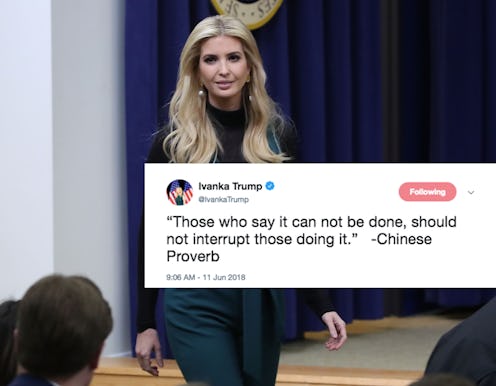News
Ivanka Tweeted A "Chinese Proverb" That Doesn't Appear To Exist

The day before the president held a historic meeting with North Korea's leader, Ivanka Trump tweeted a Chinese proverb in support of her father. Which Chinese proverb she was referencing remains to be seen, though, as people in China reportedly called her words a "fake proverb." It turns out, Trump's tweet was not a real Chinese proverb like she claimed.
“Those who say it can not be done, should not interrupt those doing it," Trump wrote, attributing the quote simply to a "Chinese proverb." She appeared to be referencing the president's unprecedented summit with North Korea and issuing a warning to those who doubt her father to watch what he can achieve.
The website Quote Investigator claims the saying actually originated in the United States, and is often attributed to the playwright and essayist George Bernard Shaw. Slight variations of the words have been quoted throughout history, with people sometimes claiming it's an old Chinese proverb. No evidence exists that the quote came from China, however.
In an effort to correct Trump's flub, some people in China took to social media sites like Weibo to search for old sayings that sound close to the quote Trump tweeted. Still, none were quite right.
Others in China questioned where Trump found the saying. "Did you get that from a fortune cookie?" one person asked on Weibo, according to NPR. "Many foreigners make up Chinese proverbs much like we make up English ones," another person wrote.
"You can call any old sh*t a Chinese proverb on the internet," tweeted Brendan O'Kane, a Chinese literature scholar, jokingly attributing his quote to the Chinese philosopher Confucius.
Trump has mistakenly quoted "Chinese proverbs" that didn't originate in China before. "Choose a job you love, and you will never have to work a day in your life," she tweeted in 2013, claiming the phrase was first said by Confucius. Similar to this week's post, no evidence exists that the saying originated with Confucius nor in China.
Larry Herzberg, a professor of Chinese at Calvin College in Michigan and co-author of a book on Chinese proverbs, told The New York Times that Trump’s tweet is "one more example of Americans ascribing a quote to the Chinese, often to Confucius, when they don’t really know the origin of the saying." He explained that some Americans believe "it sounds more legitimate and credible to pronounce a quote coming from the ancient civilization of China."
It doesn't appear Trump has caught on to the fact that the quote's origin has been questioned, as the Monday tweet is still pinned to the top of her account. Her other tweets about the president's summit with North Korea include a quote from a song by the Irish singer Val Doonican that reads: "Walk tall, walk straight and look the world right in the eye." She's also retweeted multiple photos and videos of the president meeting with Kim Jong Un, as well as posted a photo of the two men standing side by side on Instagram sans a caption.
Still, the alleged Chinese proverb is the only post that really caught people's attention. Even conservative political pundits joked about the mistake and called the saying a "fake Chinese proverb" on social media.
"Three minutes of googling suggests this is a fake Chinese Proverb," tweeted William Kristol, editor at large of the conservative magazine the Weekly Standard. "It seems in fact to be American from the turn of the 20th c.—which makes sense, since its spirit is can-do Americanism. But why are Trump WH aides giving our proverbs to China, increasing our proverb deficit?"